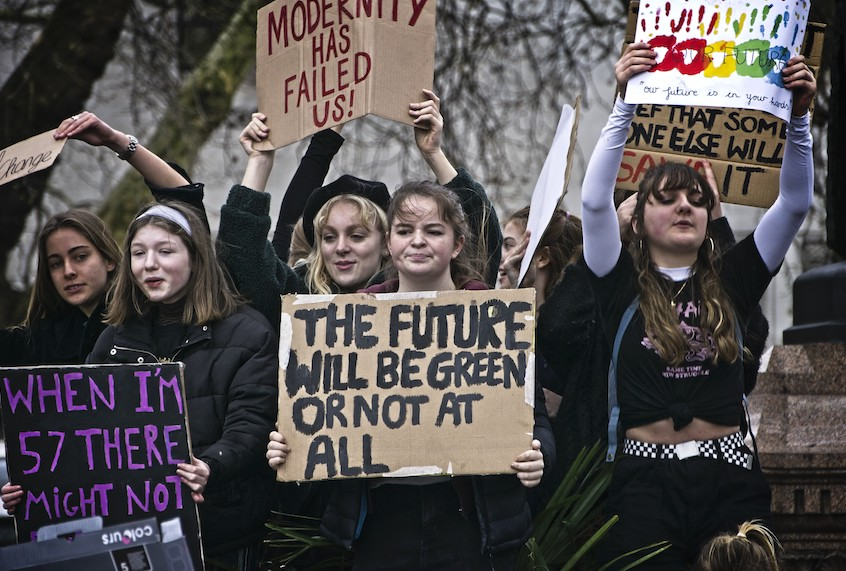Gen-Z pursuit in politics and activism
Photo courtesy of Salon
According to Forbes, the biggest threat to Generation Z is climate change, with 41% of participants citing global warming as the most important issue facing the world right now. Multiple protests have sparked out all over the world since 2019 over the need for policies to assist with climate change, and many members of Gen Z have taken to lead many, like depicted above.
November 20, 2020
As people all across the country are facing a deadly pandemic, wide-spread protests for equality, and the harsh realities of climate change, many members of Generation Z have taken it upon themselves to get involved in the political world. With them making up one-tenth of the eligible voter pool and showing growing trends that go against older generations, a period of mass activism and change could be underway.
Born from the mid-to-late 90s all the way to the late 2010s, Generation Z, is the first generation that has been born in and lived through the age of the internet.
Members of Gen-Z, like junior Rachel Teclesenbet, feel obligated to get involved in these issues because of the way it can impact her life in the future.
“The main thing that inspires me is the state of our country now and how it’s basically getting run to the ground,” said Teclesenbet. “Younger people need to try to make a change and make sure the younger generations voices are heard if we want a better country.”
Many others have also felt inspired to get into politics to help make a change in our current political climate from a moral standpoint.
“Many issues should not be up for debate, like climate change and human rights issues,” said junior Bill Chen. “Political beliefs that go against these values cut the line on my morals which made me take political standpoints.”
Consisting of young adults and students, this generation is on track to become the most educated and diverse age group of all time, with the Pew Research Center reporting a 7% increase in ethnic minorities and a 6% increase in college enrollment than in previous generations.
Out of any other generation, Gen-Z also stands the strongest in terms of problem solving and stances on our current government. Surveys from the Pew Research Center shows that Gen-Z members are much more likely to believe that the government should be doing more to solve national issues than businesses and individuals, and believe in systematic racism in America.
Considering that the majority of Gen-Z isn’t old enough to vote, many have turned to directly informing their parents and elders in various ways in order to get their message across.
“I talk to my parents and siblings about the news and [politics],” said junior Duwa Mojadiddi. “I try to inform them about current events and I also learn from them about certain topics from them as well.”
Students have even taken their interests in politics and activism towards real-world careers, like Chen.
“I’m a member of the Model UN team at West Springfield where I like to discuss international policies and relations between different countries,” said Chen. “Through these conferences, I’m able to talk about public policies that surround our world today.”
What makes Gen-Z unique from other generations is the use of social media as a tool to assist in the world of politics. According to Business Insider, 59% of Gen-Z consider social media to be their top news source, and to some students, apps like TikTok, Instagram, and Twitter are essential for them to stay informed.
Being the first generation that could truly be called ‘digital natives,’ they are, as McKinsey and Company write, “A hypercognitive generation very comfortable with collecting and cross-referencing many sources of information and with integrating virtual and offline experiences.” As the tech world grows and social media becomes more prevalent, it makes it easier and more appealing for many people of Gen-Z to integrate themselves into political spaces.
“I use social media a lot to find out about news and other world events since it’s easier and accessible,” said Teclesenbet. “There’s a lot of infographics, statistics, and information that people post that would be hard for other people to find otherwise, so Twitter, Instagram, TikTok, etc are really good for activism.”
Still, considering that Gen-Z uses social media as a news source, there are concerns for misinformation and a lack of guidance for some people.
“Fact check before you support [something]” said junior Natasha Yotmanee, “I’m getting tired of people supporting things or people on social media before actually checking if all the information is there and if it’s correct.”
Other members stress a need for unity between Gen-Z in order to succeed.
“Be respectful of other political parties and know who you are standing for,” said Mojadiddi. “It’s important to be considerate of others when making decisions in politics.”
But overall, with all the traits that make Generation Z unique from other generations and the drive that many members have towards making the world a better place, only time could tell how things fall in place and what will truly come out of this digital era.





